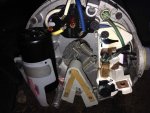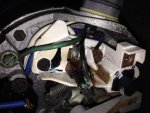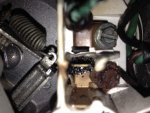I know whoever installed it made some odd decisions, but it has worked for us the last 3 years just fine. The pool has been open about a month now. About a week ago it started tripping the gfci. It tripped about 3 times over a couple days then refused to reset. So I swapped out the gfci with a new one, and everything worked fine. Until I got home from work that is, the breaker was now tripped. Now every time I restart the pump it starts to spin up then trips the breaker.
After visually trouble shooting everything electrical from the pump to the breaker box I decided to open up the pump to see if anything stood out…. And wow was I surprised. Connections are highly corroded, and plastic is melted. After talking to my dad (a retired electrician) he seems to think a mix of corrosion and too thin of wires (something I know the previous owners messed up) caused the melted plastic and very well could be tripping the breaker. However he admits he knows nothing about pool pumps so basically advised me to clean up the terminals and wires, reconnect correctly, and apply some Vaseline on the terminals to prevent future corrosion. If it fixes it great, otherwise take it to a pool pro.
This makes sense to me with my limited hand me down electrical education.
After researching on here there seems to be more causes of the tripping breaker (capacitor, stuck shaft, etc..). So I figured I would share some pictures and see what you guys think.
Thanks



After visually trouble shooting everything electrical from the pump to the breaker box I decided to open up the pump to see if anything stood out…. And wow was I surprised. Connections are highly corroded, and plastic is melted. After talking to my dad (a retired electrician) he seems to think a mix of corrosion and too thin of wires (something I know the previous owners messed up) caused the melted plastic and very well could be tripping the breaker. However he admits he knows nothing about pool pumps so basically advised me to clean up the terminals and wires, reconnect correctly, and apply some Vaseline on the terminals to prevent future corrosion. If it fixes it great, otherwise take it to a pool pro.
This makes sense to me with my limited hand me down electrical education.
After researching on here there seems to be more causes of the tripping breaker (capacitor, stuck shaft, etc..). So I figured I would share some pictures and see what you guys think.
Thanks




